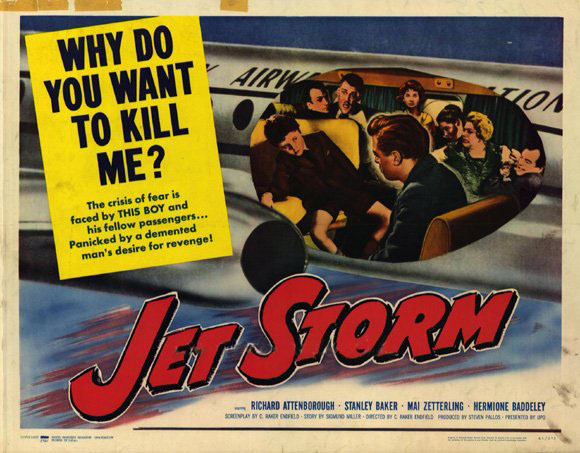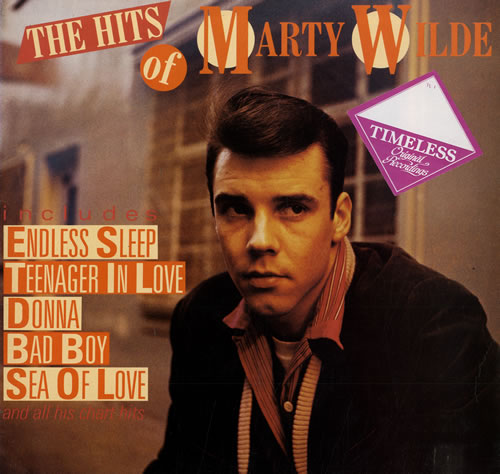Marty Wilde in the very first year of his incredibly long career – he is still performing today – steps into this film Jet Storm as a young pop star (which he was – a trend in films of the day for example Cliff Richard in Serious Charge and Ricky Nelson in Rio Bravo not to mention Elvis in Love Me Tender.
A few years earlier we had the very good The High and the Mighty starring John Wayne and Robert Stack among a veritable Whos Who of top sceen actors. That film had a cast together of very well known actors but Jet Storm’s passengers must be considered a B list from the film acting fraternity at least in comparison.
The action of this film takes place on an airliner bound for New York and the passenger list reads like a who’s who of up and coming names – Diane Cilento, Virginia Maskell, Marty Wilde, future TV star Paul Eddington, established stars – Mai Zetterling, Elizabeth Sellers, Megs Jenkins, David Kossoff, Stanley Baker and would you believe – Dame Sybil Thorndyke.
Richard Attenborough was one of the best young character actors in Britain when he emerged in the 40s. In 1948 he came to notice in 3 outstanding Rank films – “Brighton Rock” (playing a baby faced psychopath), “London Belongs to Me” (a bumbling murderer) and “The Guinea Pig” (a poor school boy who is given a scholarship to an exclusive boy’s school).
Among the passengers are the usual suspects, harassed parents, a jet setting pop star, a TV comedian (Harry Secombe), sensible elderly citizen, people with secrets etc. Among the latter is Ernest Tilley (Richard Attenborough) a rather worried looking man, travelling with his caring wife (Mai Zetterling). He is a man on a mission – he has followed a man on board who he believes is responsible for killing his little girl in a hit and run. He is bitter at the world and has had a vendetta against this man for two years. He has bought on board a device that he intends to use to blow up the plane but his ramblings are heard by two other passengers and they alert the Captain.
Stanley Baker plays the caring level headed Captain, who tries to talk some common sense into Tilley, but to no avail. As the film progresses the passengers get to hear of it and the passengers seem to split into two groups – the potential have-a-go s and the hystericals. (Hermione Baddeley is great as a hysterical passenger). There is a revolt between these two factions, but the plan goes wrong and the man at the centre of the dispute (the hit and run driver) is sucked out of the plane window – in a scene a few years before the same fate befell Goldfinger. As a last resort, a little boy is sent down to Tilley, to appeal to his deep down kindness of heart.
Marty Wilde.
Marty Wilde (born Reginald Leonard Smith, 15 April 1939) is an English singer and songwriter. He was among the first generation of British pop stars to emulate American rock and roll, and is the father of pop singers Ricky Wilde, Kim Wilde and Roxanne Wilde.
Marty Wilde was born in Blackheath, London. He was performing under the name Reg Patterson at London’s Condor Club in 1957, when he was spotted by impresario Larry Parnes. Parnes gave his protégées stage names like Billy Fury, Duffy Power and Dickie Pride, hence the change to Wilde. The ‘Marty’ came from the commended 1955 film, Marty. He was signed to the British recording arm of Philips Records.
Between 1958 and 1962 Marty had thirteen consecutive hit records, including Endless Sleep (which reached number 4 in the charts), Donna (3), Teenager In Love (2), Sea of Love (3), the self-penned Bad Boy (7), Rubber Ball (9), Little Girl (16), Jezebel (19) and Tomorrow’s Clown (33) and, after a hugely successful appearance on the BBC’s ‘6-5 Special’ – which led to an avalanche of fan mail – Marty secured a residency on the cult ABC TV programme, ‘Oh Boy!’ before hosting the original ‘Boy Meets Girl’ Show.
Marty’s backing group had The Wildcats as his backing group. In 1962 Marty took to the West End stage at Her Majesty’s Theatre starring to critical acclaim in the musical ‘Bye, Bye Birdie’, before a flirtation with the silver screen, taking lead roles in ‘Jetstorm’, The Hellions’ and ‘What A Crazy World’ (with Joe Brown). Much later, in 1974, Marty was to play the role of David Essex’s manager in ‘Stardust’, the hugely successful follow up to ‘That’ll Be The Day’.
Much later on Marty fomred The Wilde Three – with his wife, Joyce, and the future Moody Blues vocalist, Justin Hayward – and, almost uniquely for UK performers in those days, by further developing his songwriting talents (which had previously borne fruit with the top three single, ‘Bad Boy’). Marty penned hits for Status Quo (Ice In The Sun), Lulu (I’m A Tiger), The Casuals (Jesamine), Peter Shelly (Love Me Love My Dog) and for himself (Abergavenny), whilst No Trams To Lime Street, a breakthrough in TV musical plays, gave him a perfect opportunity to demonstrate his considerable versatility.
However, performing was never far from Marty’s thoughts in fact he still performs as many shows as possible today. He has topped the bill on five extensive ‘Solid Gold Rock’n’Roll’ tours and presents his own ‘Born To Rock’n’Roll’ show at theatres across the UK. To celebrate the 50th Year of a unique career, a retrospective CD, ‘Marty Wilde – The Greatest Hits, Born To Rock’n’Roll’, featuring duets with daughters Roxanne and Kim, was released by Universal Music in March 2007.
He moved partly into all-round entertainment, appearing in musicals such as in the original West End production of Bye Bye Birdie and several films.
He and his wife Joyce have four children, Kim (born 1960), Ricky (born 1961), Roxanne (born 1979) and the youngest, Marty Jr. (born 1983), who was a contestant on The Golf Channel’s The Big Break IV: USA vs. Europe in 2005. Kim, Ricky and Roxanne have worked in the music industry, like their parents.


health care blog comments powered by disqus
vfdrteeck wokbt novnznb yxmf thdadtlldikupml
… [Trackback]
[…] There you can find 31040 additional Info to that Topic: filmsofthefifties.com/marty-wilde-jet-storm-1959/ […]
… [Trackback]
[…] Find More on that Topic: filmsofthefifties.com/marty-wilde-jet-storm-1959/ […]
… [Trackback]
[…] Here you can find 41260 additional Info to that Topic: filmsofthefifties.com/marty-wilde-jet-storm-1959/ […]
… [Trackback]
[…] Find More Info here on that Topic: filmsofthefifties.com/marty-wilde-jet-storm-1959/ […]
… [Trackback]
[…] Read More to that Topic: filmsofthefifties.com/marty-wilde-jet-storm-1959/ […]
… [Trackback]
[…] Read More Information here on that Topic: filmsofthefifties.com/marty-wilde-jet-storm-1959/ […]
… [Trackback]
[…] Here you can find 70821 more Info to that Topic: filmsofthefifties.com/marty-wilde-jet-storm-1959/ […]